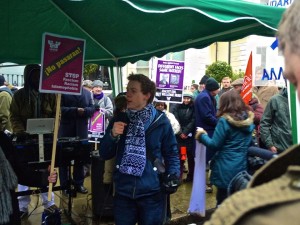Inspiring hope in a radical alternative? Owen Jones and the strategy of low horizons
 Luke Cooper replies to Owen Jones’ call for left unity
Luke Cooper replies to Owen Jones’ call for left unity
Owen Jones’ contribution to the debate on the future of the left is timely. He rightly bemoans the divisions and infighting that plague the left. Taking his cue from the crisis in the Socialist Workers Party – a collapse that hurts us all, adding further grist to the mill of those that condemn the left as dead – he calls for a new radical movement, a broad church uniting the many shades of activist-ideologue and crucially ‘those who would not otherwise identify as political, but who are furious and frustrated’. Owen is right to lament the divisions that have stalked the anti-cuts movement, and he’s right also to put the blame firmly on the sect-building left. If we are honest, in our heart of hearts, I doubt few amongst us could disagree.
Not for the first time, Owen highlights the shocking reality that the xenophobic, racist, reactionaries of UKIP are tapping into anger that the left should be seizing. But this exposes the fault lines in Owen’s argument: a tendency to suggest a political alternative is needed, only to then assert trenchantly that it’s not possible. UKIP are a political party that contest elections and offer hope of far-reaching political change. It’s a grim future of a parochial, inward looking and immigrant-hating Britain, still bedevilled with economic crisis, but without any of the tolerance, the solidarity and experience of other cultures to mitigate and offset it. This is a bleak dystopia, but it doesn’t shirk from offering ‘real change’.
And here’s the rub. Tories and Lib Dem cuts decimate our communities. Labour offers no alternative. Things polarise – the mass of the electorate look for answers. But where’s the united party of the radical left? Answer: nowhere to be seen.
Beware “M2PL”
Owen holds out the hope that a mass movement might be able to reach such a size and scope that it forces Labour to the left. He is quick to highlight the electoral failure of the left-of-Labour parties to make his case. But he doesn’t appraise his own call for a Movement-To-Pressure-Labour (M2PL) to the same kind of critical scrutiny. Labour has been marching right for decades. Its parliamentary party is stuffed with Progress-backed neoliberals that promote so-called “credibility Labour” and a majority of Labour MPs supported the pro-war David Miliband in the leadership election. They have criticised Ed Miliband for being too left, despite his attacks on striking trade unionists and courting of immigrant-baiting “Blue Labour”. Ten years ago when a million people marched against the war, Labour went ahead and did it anyway. They show little responsiveness to even the most timid of demands put forward by the labour movement.
There is no evidence Labour’s leadership would budge an inch politically in the face of even the most dynamic, far-reaching and radical mass movement. The fact is M2PL is a doomed strategy from the start. Short of a revolutionary crisis in Britain, this ship is “not for turning”.
And it’s not true that the left-of-Labour vote is the pitiful failure Owen suggests. I loathe his politics, but George Galloway won in Bradford on a clear anti-austerity platform. It showed what is possible if the belief is there that a left candidate offers a credible alternative.
Sell outs
And it’s not like Labour haven’t had the chance. In the last few years we’ve seen a mass student movement, the biggest public sector walkouts in a generation and a series of big demonstrations. Despite the splits and divisions on the radical left, people have struck and protest in large numbers. Labour has had every opportunity to change course, to stand alongside those fighting the cuts and give a real lead.
But they haven’t. M2PL only encouraged their gallop to “credibility Labour”.
That’s why we need to take care of bemoaning the state of the movement and draw out the lessons from when it’s been at its best.
We have active anti-cuts groups. Library occupations. Big NHS demonstrations. Plans for more national strikes. And activists plotting new rounds of direct action. I don’t want to paint a rosy picture, but we need to be more precise about where the problems lie and what their causes are.
It’s not just a divided and sect-ridden left – small and isolated, the organised socialist left doesn’t have the influence it should have in this crisis. Yes, the Socialist Workers Party punches ‘above its weight’, as Owen says, but it certainly doesn’t lead Britain’s labour movement. That’s why we have to look at the record of our trade union leaders too. They have led large set pieces actions, but when they had chance to deliver a real blow to the government on pensions – when over a million came out and there was a feeling of real hope – they called off the strikes having won nothing.
Bureaucracy
There is an obvious connection between the way that Labour is insulated from the strategy of M2PL and the calling off of the pensions strikes.
It’s the problem of bureaucracy and top-down control. Our union movement exists in a state of managed decline. Leaders get embedded in the bureaucracy on vast salaries when members often can’t make ends meet. Office brings not only prestige but also comfort. Conservatism sets in and sustaining the bureaucracy becomes an end in itself. This reality exists x2 for the Labour Party.
These are strong and powerful bureaucracies that stand above a largely passive and alienated membership who don’t feel they have power over their unions. The unions and Labour are imbued from top to bottom with Capitalist Realism: the widespread belief there is no alternative capitalism. They have failed to inspire hope that fundamental change is possible, and are firmly part of the “status quo order” we need to criticise and challenge.
But we can find the means to confront this bureaucracy from our activist experience.
It’s the new spirit of grassroots organisation and campaigning.
The new generation of activists abhor bureaucracy and undemocratic control. They share a deep desire not to repeat the authoritarianism of the last century and to organise in a participatory way. Our movement has been at its best when it has built vibrant grassroots campaigns, but, with the notable exception of Jerry Hicks’ campaign in Unite, it’s been less good at translating this model of organising into the trade union movement.
There are two different but crucial constituencies that the we need to think about. Firstly, there are the protestors and activists, the workplace trade union organisers, the socialists, the autonomists, the anticapitalists, who lack a coherent united political project. Secondly, there are the millions of working people – many of whom have never come on a demonstration and most of whom will vote with gritted teeth for Labour in the election – who could be won to an alternative. They could be won, if the alternative was there, if it was credible, if it was united, and if it wasn’t ridden by the usual divisions and infighting.
Two stages
Aspiration for direct democracy, for autonomy and bottom-up organising won’t go away. And organisations on the radical left that can’t respond to it and persist with bureaucratic regimes will move from crisis to crisis under this pressure. It’s this backlash against authoritarian politics which makes the new movements exciting. It expresses a wider sensibility that means large bureaucratised organisations like the Labour Party and the union tops, lack positive arguments for how they organise and what they are trying to achieve. Their size, influence and bureaucracy becomes the raison d’etre for their existence. They suffer from a total absence of vision, a complete lack of a living imagination for radical change.
What does all this mean for building an anticapitalist alternative?
Owen doesn’t appraise these problems that directly affect his argument. Labour won’t budge. M2PL is doomed. And the trade union leaders – also tied to Labour – have been all too willing to sell the struggle short. Grassroots organisation has brought a new layer of activists into politics, but they are disparate and unorganised, without a common political voice, and won’t join the sect left, let alone the Labour Party.
There are millions that can be won to an alternative, but they don’t believe the left offers it at the moment.
But to get there first the left outside of the Labour Party need to regroup. They need to reach out to activists from Occupy to UK Uncut too, and form a coherent political challenge. Most of all, it will have to be thoroughly democratic and participatory or it will go nowhere.
The second stage has to be reaching out those millions and instilling belief that a credible alternative exists on the left. In times of crisis such as these it will follow easily enough if we build organisations that recognise we can agree to disagree on some things but not let those fault lines obstruct unity.
This might all sound too critical. But to be clear, I accept large parts of Owen’s argument. Now more than ever we should get together and organise a huge anti-cuts festival, debating out alternatives, building links that can deliver action at a local and national level, encouraging unity in extraordinary diversity. Greens or Labour, anarchist or Leninist, unaligned or once-apathetic, there is no reason why we can’t build a social movement that puts down real roots. And it’s perfectly possible to do all this without it being ruined by the sect-building left.
Having lamented it I should finally add, the great thing about M2PL is that I don’t have to agree with the strategy to support the immediate goals: a united, grassroots movement. And more to the point, building a united movement – of protests, strikes, occupations, and resistance in all its forms – will provide the debates, the experiments in new forms of organisation, the testing of arguments, that are all so crucial to the renewal of a healthy left.
We certainly need one. So it’s about time we had the imagination to get out of the rut.
Left Unity is active in movements and campaigns across the left, working to create an alternative to the main political parties.
About Left Unity
Read our manifesto
Left Unity is a member of the European Left Party. 
Read the European Left Manifesto
ACTIVIST CALENDAR
Events and protests from around the movement, and local Left Unity meetings.

Saturday 17th May: National Demonstration: Nakba 77
Free Palestine: End the Genocide
12 noon – central London
More details here
More events »
GET UPDATES
Sign up to the Left Unity email newsletter.
CAMPAIGNING MATERIALS
Get the latest Left Unity resources.


